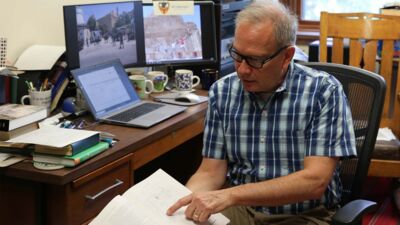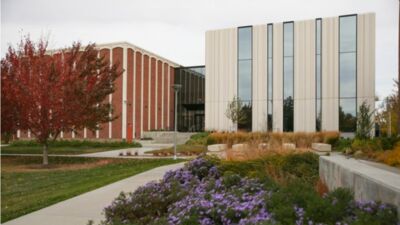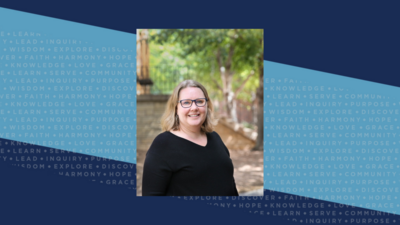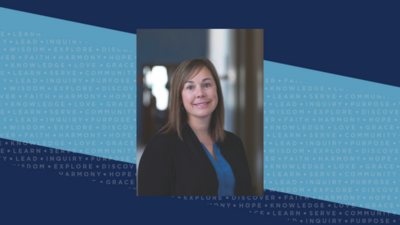Dr. Mark Meehl, Professor of Theology, Publishes Second Book, "Taanach II: The Iron Age Stratigraphy"

“In many, many ways, I’m not a normal human. By definition, being an academic, we’re not normal.”
Dr. Mark Meehl, professor of Theology at Concordia, has been, in his own words, an abnormal academic for many years now. He just published his second book, Taanach II: The Iron Age Stratigraphy, and these days, he spends his time teaching Old and New Testament classes at Concordia, drawing rocks for archaeological area plans for his third book, Taanach III: The Early Bronze Stratigraphy, and playing his trombone. He is currently characterized by extensive knowledge about the Second Temple period and ardent love of Jerusalem. It did not, however, start out that way.
Mark Meehl began his academic career as an accounting major at the University of Colorado, but he quickly found that accounting was not for him. “It was more something I felt I should do, rather than something I wanted to do,” reflected Meehl. It was when Meehl remembered his experience at Lutheran schools growing up that he felt he might want to do something completely different. “All of the Lutheran teachers who had taught me were wildly underpaid, but they loved what they did. I wanted to do that, too,” said Meehl.
Meehl decided to transfer to Concordia. Once there, he chose to major in secondary education and history. He found that even though he loved learning and teaching other people, teaching in a high school setting was not for him. “Unfortunately, I found out that the problem kids were actually my favorites. I really didn’t like the discipline part either. Most academics are introverts at heart, and I am no exception.”
After graduation, Meehl was not certain that he wanted to teach, so he hopped around to different jobs. He spent a year putting up playground equipment so he could finance a three-month backpacking trip through Europe. During that time, he found that he wanted to go back to school to teach at a college. “I realized that with teaching college, you could teach and research, without worrying as much about the discipline part. That really appealed to me,” said Meehl.
Meehl went back to school and got his Master of Arts in Religion from Concordia Theological Seminary in St. Louis. After that, he attended Johns Hopkins University. During his time at Johns Hopkins, he was given the opportunity to go on an archaeological dig in Jordan. After a while, he decided that he wanted to go to Jerusalem instead. “In Jerusalem, you get more bang for your buck in terms of Christian sites,” Meehl stated, in a rather matter-of-fact way.
Meehl then spent most of his time excavating at Tel Miqne-Ekron, which is one of the five Philistine cities mentioned in the Bible. Meehl’s time in Jerusalem was not without its adventures. “I was there during the first Gulf War, and every night there would be sirens that would go off. During that time, you would seal your door, put on your gas mask, and wait until the sirens were over. This happened every night for a month.”
Somewhere during that time, Meehl received a job offer to be the Old Testament professor at Concordia. “I had to fly back to the states and interviewed and took the job. I’ve been here ever since.” At the time, Meehl felt ready to leave. “Jerusalem is like someone you really love, and they’re being torn apart by violence and stress. It’s hard to be there for a long time.”
Despite its hardships, Meehl believes a large portion of his skill set at Concordia lies in his experiences in the Middle East. “A lot of people talk about the Old Testament, but I think I add a lot having actually excavated it. Learning about the Old Testament provides an intellectual basis for faith, and while our faith is not based on intellectual support, the support is important to have.”
Meehl finds that he is able to clearly demonstrate that intellectual case for faith because of Concordia’s unique environment. “There is just such a strong element of care and transparency here. People stay here because we like the mission, and we like that we can stay true to who we are. It’s like a marriage. You’re bringing wildly different people together, but the common denominator is faith.”
When he’s not spending his time teaching or grading, Meehl is working on his third book, Taanach III: The Early Bronze Age Stratigraphy. Meehl finds the work rewarding “Part of it, in a sense, is to do honor to the guys who dug what I’m recreating. When they dug it, they were the youngest, brightest and best of their class. The main guy, Paul Lapp, who was championing the cause passed away, so the book was kind of forgotten. I feel like it’s my duty to finish it.” Meehl joked, “Everyone working on it except me and one other guy have died pretty tragically. So, I always joke that if he goes, I’m out.”
The work Meehl does for his book is not easy. There is not a set system when it comes to archaeological mapping, so there are many times when Meehl has to submit a draft of an area plan and it comes back, with no clear directions as to how to do it better. A large portion of his time is spent finding how to map out what people before him have spoken about. Despite the difficulty, Meehl finds his work with his archaeology books rewarding. “You have to be pretty detail-oriented with this stuff, so when you finally get it right, it’s very satisfying. I feel as though I made it, it’s real and it’s good. That’s a good feeling to have.”
Meehl lives in Seward with his wife, Jan (Wolters) Meehl ‘89 and his sons Seth and Ben.
Related Stories


